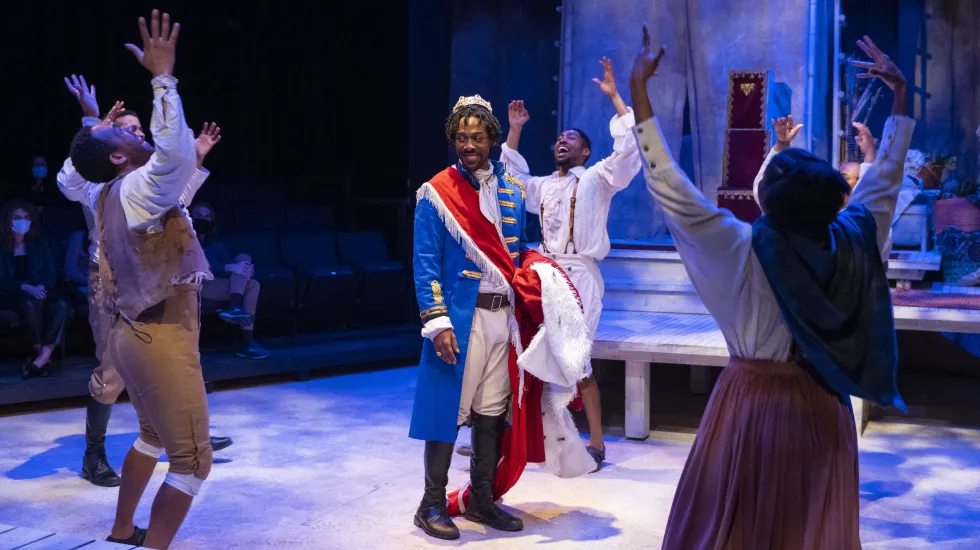
There’s a fascinating play to be written about Henri Christophe, who became Haiti’s first president in 1807 after helping lead a slave rebellion that overthrew the island’s French colonizers. Chicago has an ensemble more than capable of telling his remarkable story: they’re on stage in the House Theatre of Chicago’s production of Aime Cesaire’s 1963 drama, “The Tragedy of King Christophe.”
The problem is that Cesaire’s 1963 play (translated from the French by Paul Breslin and Rachel Ney and adapted for the House by artistic director Lanise Antoine Shelley) seems intended to be studied more than performed. It doesn’t tell a story so much as offers a montage of disparate but pivotal events that won’t fully resonate unless you’re already fairly well-versed in this particular chapter of Haitian history.
In rapid, scattershot scenes, Cesaire’s play attempts to show Henri Christophe’s evolution from people’s champion to autocratic ruler to unstable monarch.
When: Through May 29
Where: The House Theatre of Chicago at the Chopin Theatre Upstairs Mainstage, 1543 W. Division St.
Tickets: $20 - $50
Run-time: Two hours, including one 10 minute intermission
Info: thehousetheatre.com
The material has solid dramatic potential. Henri Christophe became a Haitian president after more than a century of French colonial rule, which used Haitian forced labor to supply Europe with sugar and coffee and fatten French coffers. Haiti remains, to this day, the only country in the world to mount a successful slave rebellion in 1791.
But in addition to being heroic in battle and politics, Henri Christophe declared himself king, and dispensed with the need for consensus, much less voting. Clearly, the ironies abound in the life of a former slave who led a revolt for freedom and then became a despot because he believed that only under autocratic rule could Haiti survive as a democracy.
As it moves between 1811 and 1820 and Haiti’s earliest days as an independent republic, Cesaire’s play is often more confounding than clear. The numerous scenes are short as battles are won, allegiances are lost, feasts are had, swords are brandished and moral centers shift. The tone shifts from ardent to expository to camp, the latter far too often. Shelley’s ensemble does consistent work as it moves between waging war and courtly mannerisms, but it’s not strong enough to create a coherent story where there is none.

Christophe is embodied by William Anthony Sebastian Rose II as a mercurial, regal figure, a man who knows how he wants to do things and sees no reason to act with perpetual executive privilege. Rose has the fire and the presence, but it’s difficult to get a handle on who King Christophe was in Cesaire’s messy collage of a drama.
As Madame Christophe, Leslie Ann Sheppard is a strong presence in her own right, but she’s playing a woman that’s barely an outline. At times, the mood descends into mugging camp, especially when Hugonin (Matthew Lolar), a crude, clownish court jester, takes the stage.
Henri Christophe’s attempt to create a Haitian court modeled on the likes of France’s Louis VI is also played for broad laughs, the newly named nobles stumbling and bewildered by the sudden, inexplicable and often nonsensical demands of life as a member of the gentry.
In a smart move, Shelley has filled her adaptation with music, much of it from hypnotically percussive drummer Eric Thomas. From the start, Thomas creates an immersive sonic atmosphere, getting more tones and sounds from a single drum than seems possible. Music director Ricky Harrish has the cast using rich, a cappella vocals to weave the scenes together. As the Commentator, Mondisa Monde opens the show with a goose-bump-raising clarion call to rival any siren.
The design work is strong throughout. Izumi Indaba’s costumes are intricate, colorful and period-accurate representations of Haitian military garb of the early 18th century, the women’s flowy gowns and voluminous work skirts helping make Sadira Muhammad’s vibrant choreography pulse and flow. The music and the movement — including some terrific fisticuffs and sword play from fight choreographer Jon Beal — are some of the most dynamic scenes.
In music and visuals and potential, the House has all it needs to delve into a fascinating chapter in history. But Henri Christophe needs to live and breathe as a person, not a type. And his impact needs to be plumbed with more intent than Cesaire’s “King Christophe” delivers.







